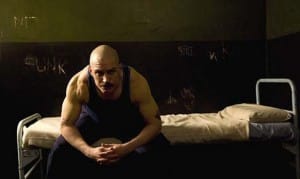
Once in recovery, you’re out of this particular prison, but your sanity is still tested in various ways. Even if you succeed at beating your substance, you might have trouble fending off the impulse to eat all the time or otherwise act irresponsibly.
As with anything that challenges your sanity, a vigorous exercise routine can keep you from totally losing your mind.
Charles Bronson, one of Britain’s longest serving prisoners who was portrayed on the big screen by Tom Hardy, was thrown into solitary confinement (in a jail with appalling conditions) for years. He kept his mind by starting a fitness regimen involving 2,000 push-ups per day and a host of other bodyweight exercises, which apparently gave him the strength to bend steel bars and punch through bulletproof glass. He chose to lose weight by changing his diet, apparently substituting egg whites for chocolate bars.
What does this prisoner’s experience mean for us? Everyone knows that working out a lot will make you strong, and that switching out sweets for protein will make you thinner. But what often gets glossed over is the direct relationship between physical fitness and mental fortitude.
In the end, it really doesn’t matter what fitness routine you do. I’m a big fan of lifting heavy and HIIT, but Bronson is proof that you don’t need a fancy gym membership – or even a field, or a basement – to use fitness to your mind’s advantage.
Strong body, strong mind.
Author
-
Chris Scott founded Fit Recovery in 2014 to help people from around the world dominate alcohol dependence and rebuild their lives from scratch. A former investment banker, he recovered from alcohol dependence using cutting-edge methods that integrate nutrition, physiology, and behavioral change. Today, Chris is an Alcohol Recovery Coach and the creator of an online course called Total Alcohol Recovery 2.0.
View all posts





